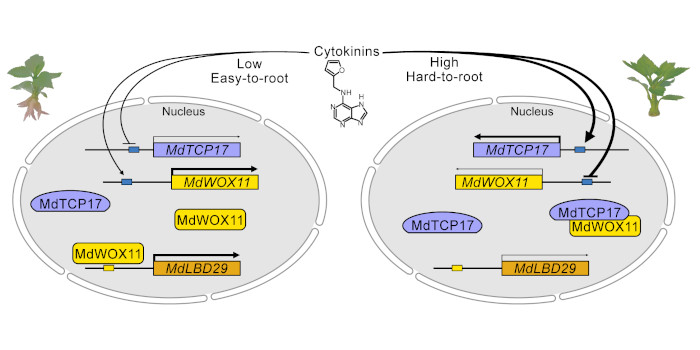Adventitious root formation in apple
Background: Adventitious root (AR) formation is important for vegetative propagation in plants and is critical for plant breeding and propagation, particularly in plants such as apple (Malus domestica). Cytokinin inhibits AR formation, and members of the TCP families participate in various aspects of plant growth.
Question: Why is it difficult for some plants to form ARs? Do TCP-mediated cytokinin responses affect AR primordium formation in apple?
 Findings: We found that a low endogenous cytokinin content improved AR formation in apples. We also found a negative correlation between the expression of cytokinin-responsive MdTCP17 and AR formation, while overexpression of MdTCP17 in transgenic apples inhibited AR formation. MdWOX11 promotes AR formation and MdTCP17 interacts with MdWOX11. MdWOX11 directly binds to the promoter of MdLBD29 and positively regulates its expression. Furthermore, MdTCP17 reduced the binding of MdWOX11 to the MdLBD29 promoter, and co-expression of MdTCP17 and MdWOX11 reduced MdLBD29 expression. Our study thus revealed a mechanism by which MdTCP17 and cytokinin inhibit AR primordium formation.
Findings: We found that a low endogenous cytokinin content improved AR formation in apples. We also found a negative correlation between the expression of cytokinin-responsive MdTCP17 and AR formation, while overexpression of MdTCP17 in transgenic apples inhibited AR formation. MdWOX11 promotes AR formation and MdTCP17 interacts with MdWOX11. MdWOX11 directly binds to the promoter of MdLBD29 and positively regulates its expression. Furthermore, MdTCP17 reduced the binding of MdWOX11 to the MdLBD29 promoter, and co-expression of MdTCP17 and MdWOX11 reduced MdLBD29 expression. Our study thus revealed a mechanism by which MdTCP17 and cytokinin inhibit AR primordium formation.
Next steps: Whether other regulatory mechanisms affect AR formation is unclear. For instance, what are the downstream target genes of MdTCP17?
Reference:
Jiangping Mao, Chundong Niu, Ke Li, Li Fan, Zhimin Liu, Shaohuan Li, Doudou Ma, Muhammad Mobeen Tahir, Libo Xing, Caiping Zhao, Juanjuan Ma, Na An, Mingyu Han, Xiaolin Ren, Dong Zhang (2023) Cytokinin-responsive MdTCP17 interacts with MdWOX11 to repress adventitious root primordium formation in apple rootstocks. https://doi.org/10.1093/plcell/koac369



